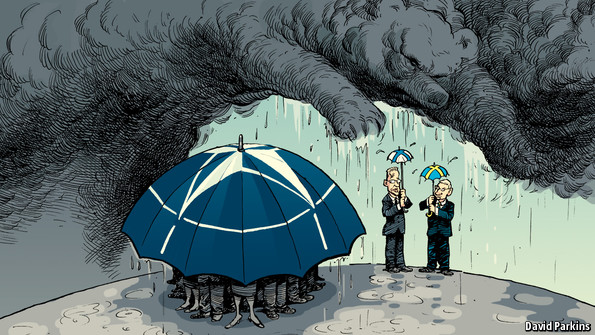
Edward Lucas
1er mai 2015

To calm your nerves, and jangle those of your enemies, few things work better than a visit from a couple of F-22 Raptor warplanes. America’s fifth-generation fighter aircraft is stealthy, speedy and agile. These amazing machines have been touring the frontline states of Europe – including Lithuania and Ukraine – in recent days, as part of the U.S. reassurance initiative.
But a report published last week on the Finnish Foreign Ministry’s website is probably more important. Its four authors (two Finns, a Swede and a Frenchman) take a lengthy and sober look at practical implications of Finland joining NATO.
The problem is simple: without Finnish and Swedish help, NATO will be hard-pressed to defend the Baltic states against a determined Russian attack, which would be catastrophic for the security of non-NATO countries. Yet unless those two countries are members of NATO, they cannot be fully integrated into the alliance’s planning.
“The problem is simple: without Finnish and Swedish help, NATO will be hard-pressed to defend the Baltic states against a determined Russian attack.”
Opinion is shifting, particularly in Sweden, where the main opposition parties – and some members of the ruling Swedish Social Democratic Party – now want to join. Finns are more skeptical, though if the country’s leadership were to recommend joining NATO, most Finns would agree.
The report bleakly outlines the seriousness of the situation. Faced with a revisionist Russia, Finland and Sweden would be safer once inside NATO. But the decision to join would provoke a sharp, and perhaps dangerous, reaction from Russia. Managing that will be complicated.
It would be much better for Finland and Sweden to join the alliance together
The authors stick to their mandate of exploring the issue, rather than making recommendations – with one exception. They argue that it would be much better for Finland and Sweden to join the alliance together. If Sweden joins and Finland doesn’t, then it risks signaling to Russia that decision-makers in Helsinki lack willpower. If Finland joins and Sweden doesn’t, it poses tricky problems for NATO: how do you defend an ally that you can’t easily reach?
I have been urging both countries to join NATO for years. My argument was “do it now while you don’t need to, because the circumstances that will make it necessary will also make it harder.” My worry now is that this report is an excellent contribution to yesterday’s question, not tomorrow’s.
If NATO were in fine shape, then membership would indeed solve all of northeastern Europe’s security worries. But it isn’t. The F-22s are fine aircraft, but America has far too few of them, and they run out of missiles scarily fast. Other NATO countries are lagging woefully behind America.
Overall, Western defence budgets have been hollowing out for years, particularly with regard to the dull and politically unpopular business of territorial defense. NATO defence spending is no longer falling, but it is nowhere near high enough. And most members still spend most of their money on the wrong things: salaries and buildings, rather than modern weapons. We have yet to re-establish real deterrence. Internal and external threats divide and distract us.
“Finland and Sweden should hurry. The sooner they join NATO, the less likely they are to need its security guarantee. Moreover, by strengthening the alliance, they also make its survival more likely.”
It is not all doom and gloom. Donald Trump is not yet president, and perhaps never will be. Congress fumes at the stinginess of European allies, but it still votes to spend borrowed money on their defense. NATO’s Warsaw summit in July will bring new attention to the frontline states: an American “base” (actually a headquarters) in Poland, plus bilateral “framework nation” defence sponsorships for Estonia (from Britain), Latvia (probably from Canada) and Lithuania (from Germany). It looks good, even if the alliance is running on empty tanks.
Finland and Sweden should hurry. The sooner they join NATO, the less likely they are to need its security guarantee. Moreover, by strengthening the alliance, they also make its survival more likely.
This article was originally published by the Center for European Policy Analysis (CEPA). Edward Lucas is a senior vice president at CEPA where he leads the institute’s Information Warfare Initiative.